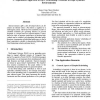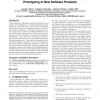94 search results - page 5 / 19 » Non-clairvoyant Scheduling Games |
124
click to vote
HICSS
2003
IEEE
15 years 6 months ago
2003
IEEE
Microeconomics offer a far developed theory on the subject of rational choice. This theory is applied to a multi-agent system, which has been modeled in order to establish schedul...
117
click to vote
ICSE
2010
IEEE-ACM
14 years 11 months ago
2010
IEEE-ACM
The development of video games comprises engineering teams within various disciplines, e.g., software engineering, game production, and creative arts. Game jams are a promising ap...
109
click to vote
ATAL
2011
Springer
14 years 1 months ago
2011
Springer
Building on research previously reported at AAMAS conferences, this paper describes an innovative application of a novel gametheoretic approach for a national scale security deplo...
CONCUR
2007
Springer
15 years 7 months ago
2007
Springer
The notion of innocent strategy was introduced by Hyland and Ong in order to capture the interactive behaviour of λ-terms and PCF programs. An innocent strategy is defined as an ...
113
click to vote
TCS
2002
15 years 24 days ago
2002
In a heap model, solid blocks, or pieces, pile up according to the Tetris game mechanism. An optimal schedule is an in nite sequence of pieces minimizing the asymptotic growth rat...


